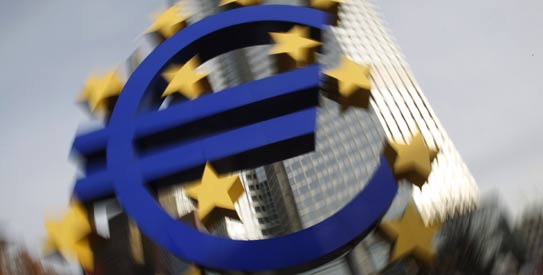 (Reuters) – Unemployment in the euro zone reached its highest level in almost 15 years in February, with more than 17 million people out of work, and economists said they expected job office queues to grow even longer later this year.
(Reuters) – Unemployment in the euro zone reached its highest level in almost 15 years in February, with more than 17 million people out of work, and economists said they expected job office queues to grow even longer later this year.Joblessness in the 17-nation currency zone rose to 10.8 percent – in line with a Reuters poll of economists – and 0.1 points worse than in January, Eurostat said on Monday.
Economists are divided over the wisdom of European governments’ drive to bring down fiscal deficits so aggressively as economic troubles hit tax revenues, consumers’ spending power and business confidence which collapsed late last year.
February’s unemployment level – last hit in June 1997 – marked the 10th straight monthly rise and contrasts sharply with the United States where the economy has been adding jobs since late last year.
“We expect it to go higher, to reach 11 percent by the end of the year,” said Raphael Brun-Aguerre, an economist at JP Morgan in London. “You have public sector job cuts, income going down, weak consumption. The economic growth outlook is negative and is going to worsen unemployment.”
Separate data released on Monday showed manufacturing activity in the euro zone shrank for an eighth successive month in March, providing further evidence for Brussels’ forecast that euro zone output will shrink 0.3 percent this year.
The European Commission, which along with Berlin is a driving force behind the EU’s debt reduction strategy, said joblessness showed countries must enact difficult reforms.
Public resistance is rising in Italy to Prime Minister Mario Monti’s labor market reforms, while Spain’s premier, Mariano Rajoy, faced his first general strike last week.
“This is why, more than ever, it is important to carry out structural reforms in countries where the growth potential remains low and where we don’t see the creation of new and better jobs,” Amadeu Altafaj, the spokesman for the EU’s top economic official Olli Rehn, told reporters.
Despite the economic vista, the European Central Bank is expected to hold interest rates at 1 percent at its monthly meeting on Wednesday, as rising oil prices keep inflation above its 2 percent target.
“With inflation remaining stubbornly high throughout the euro zone, there is very little hope of a consumer recovery,” said Jennifer McKeown, an economist at Capital Markets.
NORTH-SOUTH DIVIDE
Discussions among ECB board members in Frankfurt are further complicated by a melting away of more optimistic forecasts made at the start of the year.
Even in the bloc’s biggest economy, Germany, sentiment in the manufacturing and construction sectors fell in March.
Despite that, the divide between the euro zone’s wealthy north and depressed south was again clear on the unemployment front. Years of runaway lending, outdated labor laws and uncompetitive industry in the south have sucked the region into a painful slump.
The jobless rate in Germany was steady at 5.7 percent of the working population in February, while unemployment in southern Europe rose from already high levels, reaching almost 24 percent in Spain – the highest in the EU – and 9.3 percent in Italy.
Spain unveiled one of its toughest ever budgets late last month to make savings of 27 billion euros ($36 billion) for the rest of 2012 as the country seeks to cut its deficit.
Spanish Economy Minister Luis de Guindos said last week that the measures would be implemented as soon as possible, adding that any suggestions that Madrid would need the kind of emergency funding given to neighboring Portugal were “absurd”.